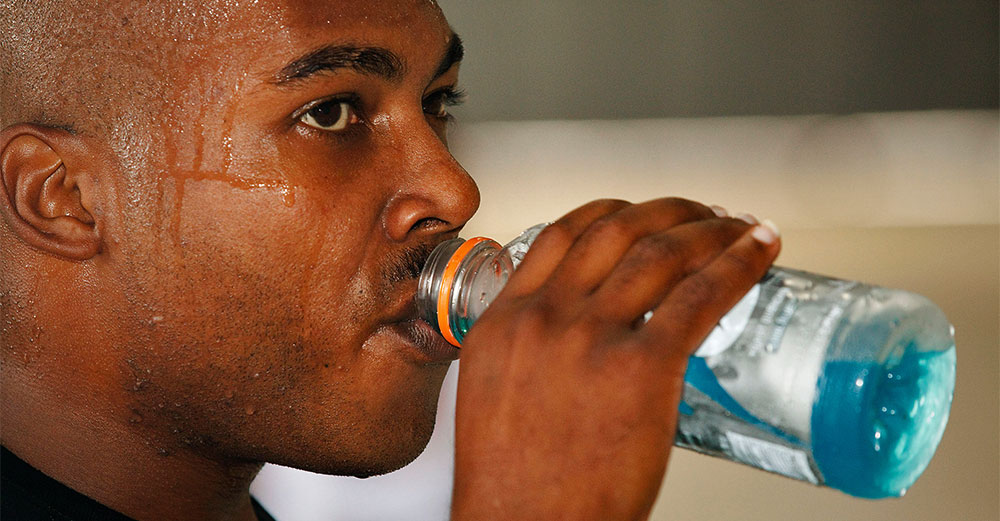
Spring is here, and many of us are itching to get back outside to walk, run, and play our way back into a fitness routine. As the workouts increase and the weather warms outside, the need for energy replenishment and hydration increases. What do we use for these needs?
Many people who play sports and engage in intense exercise programs enjoy drinking energy and sports drink to replenish and refresh themselves after workouts. According to Packaged Facts’ report “Sports Nutritionals Market Is Back in Swing, sports drinks were set to become a $7.4 billion dollar industry in 2013! After all, the sweat, pain, and exhaustion we go through need some liquid refreshments. But are these sports drinks harming or enhancing your health? Varying from competitive athletes to students that occasionally enjoy exercising and participating in recreational activities, there are similar effects that these drinks have on each person. The science behind consuming sports and energy drinks is one to be aware of.
From all of the various companies that offer these different types of drinks claiming to have distinctive functions once they are consumed, there are some key components to consider and be aware of when drinking your favorite sports drinks:
What are some reasons to replenish with sports drinks?
When participating in physical activities, your body becomes depleted from nutrients such as potassium, along with calories/carbohydrates and electrolytes. Consuming sports drink can help to replenish your body with electrolytes, which can decrease the chances of cramping and injuries. These electrolytes regulate our nerve and muscle function, our hydration, the rebuilding of damaged tissue, and more. Remember, when your body is in the process of burning calories, you experience energy loss. Consuming sports drinks provides you with the needed carbohydrates to replace the energy lost and give you an extra boost for an effective workout.
Also, not everyone likes to drink water while exercising. Consuming sports drinks with tasteful flavors is easier and more enjoyable for your taste buds, all while providing your body with some needed nutrients.
What to look out for in sports drinks
For one, sports drinks are high in sugar. Consuming it during every workout, and even outside of exercise, adds additional calories to your diet that may not always be needed. The goal should be to replenish used calories and electrolytes, not add excess when not needed. As with everything, moderation is key. The consumption of sports drinks overtime can also become very unhealthy for your teeth. Sports drinks have the potential to erode your teeth and cause decay like excess soda consumption, and the damages become irreversible. We need to be aware of these dangers and balance our intake so we can stay healthy outside of the muscles we are trying to build while exercising.
In addition to sugar and calories, scientific experiments reveal that some sport and energy beverages contain a large amount of caffeine which becomes harmful for your nervous system when consuming it overtime.
In conclusion…
Despite these pros and cons, The American College of Sports Medicine recommends that people drink about 17 ounces of fluid about two hours before exercising in order to promote adequate hydration and prevent excess water. Hydrating at regular intervals is also very important in order to intake fluids at the same rate as you’re losing it while sweating. SUNY campuses all have nutrition and sports science professionals available for students to learn how best to take care of their bodies during workout routines.
But always remember, stay hydrated to prevent any cramping and maximize your workout results!




James, congratulations on the article!
I already stopped moisturizing myself and I ended up suffering from it. This text helps to clarify the facts 🙂
I am glad that the blogger wrote this interesting article for the readers. When I saw the pictures in the post, I can relate what the blogger wants to share. This site is very entertaining.
As noted here, sports drinks can be enjoyed in moderation, just as with other sources of calories. These beverages aid hydration, as do many of our member companies other products, including bottled water, 100% juice, ready-to-drink teas, and more. Our industry is dedicated to providing an array of options in varying calorie counts and sizes so that consumers may pick and choose how they prefer to hydrate.
-American Beverage Association